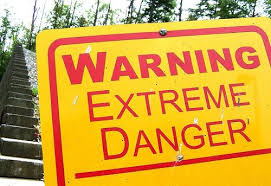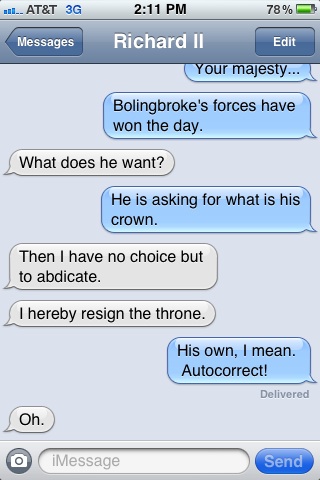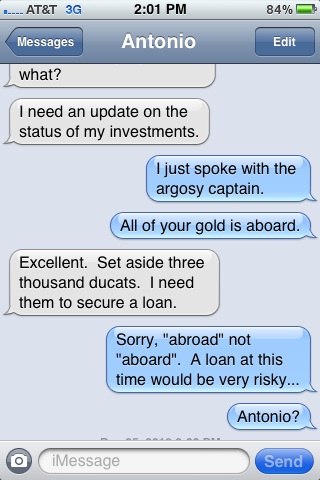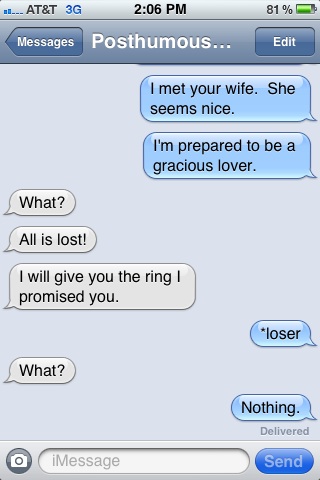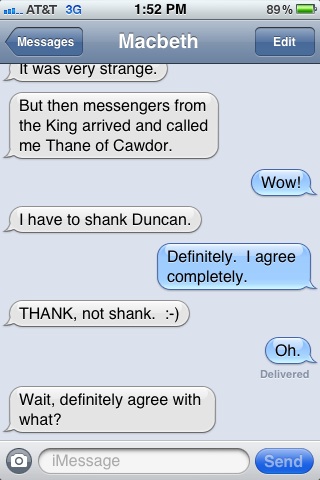The term “nature vs. nurture” is a poetic turn of phrase that refers to an ongoing reexamination of the roles that heredity and environment play in determining who we are as individuals. The expression was popularized in the 19th century by Francis Galton, though the debate and the phrase had been around much longer than his day. In fact, Shakespeare himself juxtaposed the two words in The Tempest, as Prospero describes Caliban thusly:
A devil, a born devil, on whose nature
Nurture can never stick;
Shakespeare was not the first to contrast these two words, but Galton is known to have been a Shakespeare fan, and it seems reasonable to imagine this was his source.
Shakespeare’s plays are filled with models of the intricate workings of human nature, depictions of how individuals are influenced by external factors, and the complicated interplay between the two. As we will soon see, Shakespeare was also an early voice in this conversation, and an often-quoted source by later thinkers as well. Therefore, our Shakespeare Follow-Up will focus on the development of the nature vs. nurture debate from Shakespeare’s time to ours today.
But please note that this is a very large topic, and I’m going to sweep through it rather quickly, so feel free to do your own follow up on any topic here that interests you.
Political philosophers such as Hobbes, Locke, and Rousseau are often grouped together as “social contract theorists,” because they presented ideas about how and why humans form societies. But when considering their impact on the nature/nurture question, it’s more illustrative to focus on their differences.
In Leviathan (1651), Thomas Hobbes argued that human beings, existing in a state of nature, are savage and brutal. Therefore, we willingly surrender our autonomy to a sovereign unconditionally in order to gain security from our murderous brethren. John Locke, in An Essay Concerning Human Understanding (1689), lays out the idea that we refer to today as tabula rasa, or “the blank slate.” Rather than seeing human beings as being innately evil, as Hobbes does, he sees us as being neither good nor evil naturally, but rather open to influence from our environments. Jean-Jacques Rousseau presents a different view of the natural state of the human in his book Émile (1762). For Rousseau, humans are born innately good, and it is society that corrupts.
Naturally, the choice of which of these three views to adopt will have a profound effect on how a culture views education and child rearing. We can’t control the nature, but we can structure the nurture to make the best use of our understanding of it. If we believe that human beings are born evil, we’ll want to make discipline the backbone of our educational system. If we believe that children are blank slates, we’ll seek to fill those slates with our best models for citizenship and morality. If we believe that our students are innately good, then maybe the best thing we could do would be to just get out of the way and let them explore the world they find themselves in. You can hear echoes of these debates in today’s conversations about education.
In the post-Darwinian era, psychologists began to codify the progression of human development into various stages. The progression was determined by nature, but profoundly impacted by environment. Sigmund Freud described five psycho-sexual stages of development in childhood. The eight psycho-social stages outlined by Erik Erikson were strongly influenced by Freud, but extended to adulthood.
But wait! A lifetime of human progression divided into stages? Why does that sound familiar? Oh right…
All the world’s a stage,
And all the men and women merely players:
They have their exits and their entrances;
And one man in his time plays many parts,
His acts being seven ages. At first the infant,
Mewling and puking in the nurse’s arms.
And then the whining school-boy, with his satchel,
And shining morning face, creeping like snail
Unwillingly to school. And then the lover,
Sighing like furnace, with a woful ballad
Made to his mistress’ eyebrow. Then a soldier,
Full of strange oaths, and bearded like the pard,
Jealous in honour, sudden and quick in quarrel,
Seeking the bubble reputation
Even in the cannon’s mouth. And then the justice,
In fair round belly with good capon lin’d,
With eyes severe, and beard of formal cut,
Full of wise saws and modern instances;
And so he plays his part. The sixth age shifts
Into the lean and slipper’d pantaloon,
With spectacles on nose and pouch on side,
His youthful hose well sav’d, a world too wide
For his shrunk shank; and his big manly voice,
Turning again toward childish treble, pipes
And whistles in his sound. Last scene of all,
That ends this strange eventful history,
Is second childishness and mere oblivion,
Sans teeth, sans eyes, sans taste, sans everything.
It seems that Jacques in As You Like It was on the right track, centuries ahead of his time. Freud famously wrote about Hamlet, and Erikson even cites Shakespeare’s “ages of man” in his 1962 article “Youth: Fidelity and Diversity,” which also provides an in-depth discussion of Hamlet.
Jean Piaget (1896-1980) developed a set of four stages of cognitive development that have been profoundly influential in our understanding of human nature. Piaget believed that these stages developed naturally, and that new levels of learning become possible at each stage. Score one point for nature! Lev Vygotsky (1896 – 1934) built on these ideas, but demonstrated that learning could actually encourage cognitive development. There is a zone between what students are capable of doing on their own and what they can do in an environment that includes guidance and collaboration. Stretching into this zone can assist children in progressing developmentally. There’s one point for nurture, and it’s a tie game.
In fact, it will always be a tie game. Everyone agrees that both nature and nurture are significant, and we can argue about various degrees. Noam Chomsky (1928 – ) revolutionized the field of linguistics by describing, in Syntactic Structures (1957), the innate ability of the human brain to acquire language. This was a challenge to the behaviorist philosophy that was dominant at the time. In Frames of Mind (1983), Howard Gardner describes a system of multiple intelligences that different people seem to possess in different measures. The rise of theories such as Chomsky’s and Gardner’s would seem to move the needle towards nature, but the fact that they continue to influence our educational practices demonstrate the importance of nurture in the equation all the more powerfully.
Shakespeare, of course, didn’t know any of this. Nevertheless, his understanding of the complex interplay between nature and nurture was nuanced enough for him to create models that still have us debating the actions and motivations of fictional characters as though they were real people. Why, for example, does Macbeth kill Duncan? Is it because he’s ambitious? Or does he succumb to pressure from his wife? If it’s the former, would he have done so without prompting from the witches? And if it’s the latter, what elements of his nature make him susceptible to his wife’s influence?
I give up. What do you think, Lady Macbeth?
Glamis thou art, and Cawdor; and shalt be
What thou art promis’d. Yet do I fear thy nature;
It is too full o’ the milk of human kindness
To catch the nearest way; thou wouldst be great,
Art not without ambition, but without
The illness should attend it; what thou wouldst highly,
That thou wouldst holily; wouldst not play false,
And yet wouldst wrongly win; thou’dst have, great Glamis,
That which cries, ‘Thus thou must do, if thou have it;’
And that which rather thou dost fear to do
Than wishest should be undone. Hie thee hither,
That I may pour my spirits in thine ear,
And chastise with the valour of my tongue
All that impedes thee from the golden round,
Which fate and metaphysical aid doth seem
To have thee crown’d withal.
A lot of these Follow-Ups are about how much Shakespeare didn’t know. This one is about how much he still has to teach us.






